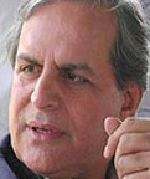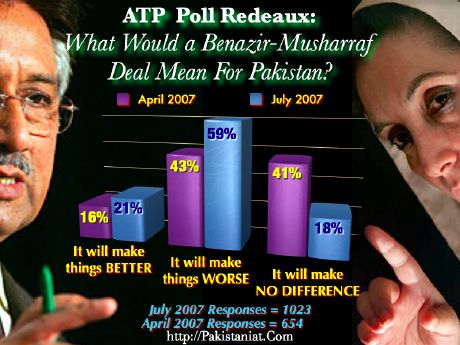Adil Najam
 The good news is that politics – in the good sense of the term – is back in Pakistan. The bad news is that it is not clear where it is going.
The good news is that politics – in the good sense of the term – is back in Pakistan. The bad news is that it is not clear where it is going.
Today we heard the news of the Supreme Court asserting its independence again by ordering the release of Javed Hashmi. I also want to share the results of our most recent ATP Poll – on the ‘new BB-Musharraf deal.’ I put it in inverted commas because there is much more speculation about this than fact.
But, before that, the news of the day. Which is that the Supreme Court has passed an order directing the concerned authorities to immediate issue the order for release of the incarcerated Muslim League-N Acting President, Javed Hashmi.
According to BBC News:
Pakistan’s Supreme Court has granted bail to opposition leader Javed Hashmi, who was jailed for inciting mutiny in the army, forgery and defamation. The former acting president of a Pakistan Muslim League faction was sentenced to 23 years in jail in 2004. Mr Hashmi was effectively serving at most seven years in jail as he was handed seven different prison terms running concurrently.
He was arrested in 2003 over a letter critical of President Pervez Musharraf. Mr Hashmi’s appeal against his sentence is yet to be taken up for hearing by the high court in Lahore. But the country’s Supreme Court, headed by Chief Justice Iftikar Chaudhry, acting on a separate review petition, granted Mr Hashmi bail saying that he had already served his sentence. “If periodic remissions are counted, he has already served his entire sentence,” Chief Justice Chaudhry said, while granting bail to Mr Hashmi. “Even if remissions are not allowed to him, he has nearly served the sentence, counting the length of his imprisonment before and during the trial,” he added.
… Javed Hashmi was arrested after circulating a letter bearing a military letterhead which was purportedly written by disgruntled officers. It called for an inquiry into alleged corruption in the army’s senior ranks and demanded a judicial investigation into a Pakistani military operation in Indian-administered Kashmir in 1999. The authorities claimed the letter, which was also highly critical of Gen Musharraf and his alliance with the United States, was a forgery. Mr Hashmi’s allies said they believed the letter was genuine and that the charges of forgery were politically motivated. He was convicted at a trial behind closed doors in the city of Rawalpindi, near Islamabad. Mr Hashmi’s trial was widely criticised as “politically motivated” by observers and opposition groups. The US and other foreign governments had expressed concerns over lack of transparency in the trial.
Is this a sign – one hopes – of a revitalized and energized Supreme Court after its reinstatement of the Chief Justice? We certainly hope so. Or is this a sign that the Musharraf government is reaching out not only to the PPP but also to the PML-N? That will also be a good thing. Or is the meaning of this something very different altogether?
Whatever its meaning, this, I think, is one more data point in the growing trend of ‘politics’ – in the good sense – having returned to Pakistan. The results of our most recent ATP Poll seems to suggest that same. But it also shows that there are more questions in Pakistan politics today, than answers.
Our recent Poll was a repeat of an earlier poll we had conducted back in April when rumors of such a deal had first surfaced. We asked the same question and gave the same options as before. That is: “What would a Benazir-Musharraf Deal Mean for Pakistan?” Of course, much had happened between April and July – including the Lawyers movement and the Lal Masjid operation – so we wanted to see how opinion of ATP readers had changed. Here is what we found:
First, the majority opinion remains that the deal will make things WORSE in Pakistan. Importantly, the percentage of people thinking so has increased – from 43 percent of the polled in April to 59 percent now.
Second, the percentage of people thinking that it will make things BETTER has also increased – from 16 percent to 21 percent. But this opinion remains a clear minority.
Finally, the paradox above is explained by the fact that the number of people who think it will make NO DIFFERENCE have gone down dramatically – from 41 percent to 18 percent. From the numbers it seems that the people who think it will make a difference has gone up drastically but most of them think it will make things only worse.
Like any web-based poll, this is only indicative of the type of people who visit our page and is NOT a scientific poll by any stretch. Some 654 people had voted in the April Poll and 1023 people voted in our July Poll. (I suspect, however, that the real number in teh second poll might have been less since some people were able to vote more than once because we moved computer servers during this period and because the poll was hosted outside ATP; however, I believe the results would have still been the same and were stable at these percentages nearly from the start).
The deal is seen to be more important now partly because it is seen to be more real. The real interesting question now is what explains this change and what does it mean. What do you think about this?
To me, this only reconfirms something that I had written in an article for The Friday Times last week on the All-Parties Conference (APC):
The good news is that politics – in the good sense of the word – is back in Pakistan. There is a palpable sense that people are tired of military rule. But what we are seeing is much more than boredom with authoritarianism. There is a clear realization that political problems need political solutions. That politics may not always be the most efficient way of doing things, but it is the most legitimate. That institutions do mater. That the great issues of state and policy cannot be resolved through simple managerialism. That nations need leaders, not Chief Executive Officers (CEOs).
The bad news is that the one group that seems even more unprepared for this sea change in public sentiment than Gen. Musharraf and the ruling PML-Q, are the opposition political parties. The recently concluded All Parties Conference (APC) demonstrated exactly how. On display in London was the same petty bickering, hollow sloganeering, lust for personal power, and the disconnect from the real problems of Pakistanis today that has so often turned so many Pakistanis away from these same political parties. It could be argued that the APC was the only good news that Gen. Musharraf has had in a very long time. It reminded Pakistanis of the poverty of political alternatives to military rule.
This is a great shame. The people of Pakistan seem quite ready – even eager – for a return to politics — and to meaningful democracy. If the APC is any indicator then it is not at all clear whether our politicians are.
… You have to stand up and say what you stand for. These are momentous times and the people of Pakistan want to be have a say in the nation’s future. This is not simply a question of who the next leader should be; it is a question of what the various leaders stand for. At the end of the day it does not matter if all the opposition parties are united. Why should they be? After all, they are competitors. But it does matter that the people of Pakistan know what the various political parties stand for and who they stand with. The APC failed for many reasons, at least one of them was that it was very evident who the parties stand against, but it was not at all clear what they stood for.





















































Well, just because China and India have the same problem does not justify the trickle-down capitalism that the world bank advocates… with the way the trickle-down thing actually, well, trickles down ( ;) ), it may take forever to bridge the gap between the poor and the rich… even when this model succeeds (succeeds, that is, in enriching the already rich), the gap continues to increase and the trickle-down thing is rendered valueless by comparison… I don’t know enough economics to suggest any alternatives, but this model strikes me as seriously unjust…
As for difference of rich and poor, thats part of any emerging free market economy. China and India have same problem.
Oh, and for that matter, if this deal comes through, Sherpao will merge his faction with the parent party, as will Yousaf Saleh Hayat, Dr. Sher Afgan Niazi and the other “patriots”… and BB being BB, will welcome them back with open arms… figuratively speaking of course ;)
For what its worth, former Punjab governor and serial wife-beater Ghulam Mustafa Khar, who rejoined the PPP only recently, has spoken out openly against the deal… in 1971 he stuffed the then COAS Gen. Gul Hassan into the back of his car and drove him from Islamabad to Lahore, where he told him that he was fired… these two things may be the man’s only saving graces…
it was ZAK who used slogans “Idhar ham udhat tum” and he rejected any power sharing with Mujib. He nationlaized corporations and destroyed economy.
Well i have not visited Karachi ffrom last 5 years but I think situtaion is much better then it was in 1984-1997. Just because of one incident we can not say that MQM has established state within state again. On May12 they done it with permission so they seems to be under control. Morever they did worked hard to communicate with ANP to avoid a full scale ethinic riots and broke some transport deal. I dont support MQM but Mush needs MQM to balance Jamat Islami in Karachi.
But how will they respond to the deal? If Aitzaz Ahsan and other like minded folk in the PPP break away, will they manage any electoral success? I think not… they won’t have the machinery to run their campaign… if they choose to join the opposition, they’re not likely to be effective at all… my guess is that they’ll swallow their pride and stay in the party…
Aitzaz would make a great PM by the way… but I guess I’m only dreaming… there was an article on BBC Urdu the other day which claims that BB has been approached by Q League members for party tickets… she’ll dish them out too, given her record…